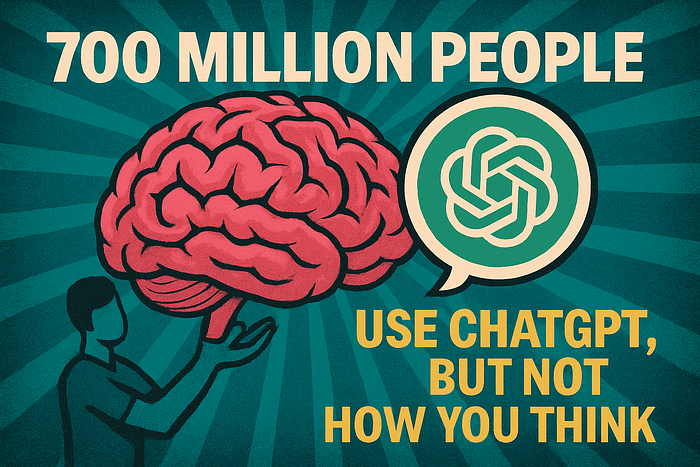
The Future of Work: Upskill or Be Left Behind
Last Updated on November 6, 2023 by Editorial Team
Author(s): Srijay Gupta
Originally published on Towards AI.

The rise of Artificial Intelligence is fundamentally transforming the world of work. Per the World Economic Forum’s 2023 jobs report, the next five years will see 83 million jobs being displaced due to technological and economic changes. At the same time, 69 million new roles could emerge as companies adopt new technologies and markets develop. This constitutes a structural churn of 152 million jobs, equivalent to 23% of the 673 million employees represented in the dataset. The net result is a potential loss of 14 million jobs, or 2% of the workforce studied.
These statistics highlight the dual nature of AI’s impact. On one hand, the technology can automate routine and repetitive tasks, freeing up human workers to focus on more meaningful and creative work. AI and robotics could contribute up to $15 trillion to global GDP by 2030 according to PwC analysis. On the other hand, certain jobs will inevitably be lost to automation across sectors like manufacturing, customer service, trucking, and administrative work. We cannot ignore this downside even as we aim to maximize the upside.
As AI capabilities rapidly advance, we are writing the next chapter of the future of work. But this is not a story that technology will dictate alone. The decisions made by governments, employers, educators, and workers today will determine whether AI serves to augment human potential or exacerbate social inequalities. Proactive preparation and ethical implementation are key to shaping an AI-powered world where technology enhances lives and livelihoods.
Reskilling and Upskilling

The pace of technological change means that a majority of the global workforce will require additional training in the coming years. According to the above-mentioned WEF jobs outlook, 60% of workers will need retraining by 2027, but only half currently have access to adequate upskilling opportunities through their employers. In terms of priority skills for the future, analytical thinking is expected to be the top focus area of training programs over the next five years, accounting for 10% of all reskilling initiatives on average. The second priority is building creative thinking, which will make up 8% of upskilling efforts. Training in AI and big data skills specifically ranks third, with 42% of companies planning to focus on it.
Other key skills employers aim to develop include leadership and social influence, resilience and agility, and lifelong curiosity and learning. Two-thirds of companies foresee a return on their skills training investments within a year in the form of gains like improved worker mobility, satisfaction, and productivity.
Notably, some skills are substantially more prioritized in corporate strategies relative to their current perceived importance. AI and big data in particular, is ranked much higher in planned training programs versus its evaluated role in current workforces. This indicates firms see it as a strategically vital future competency. Similar gaps exist for leadership and social influence, design, environmental stewardship, marketing, and networks/cybersecurity.
It’s not just about preparing for the jobs that will be created; it’s also about adapting to the jobs that will be transformed. Companies are beginning to recognize the cost of hiring new, externally trained talent can be prohibitive, and there’s an inherent value in retaining employees who are already culturally aligned with the organization. Another critical factor is the alignment of reskilling programs with the company’s broader strategic goals. Instead of generic training modules; the skills taught must be directly applicable to business needs and should prepare employees for future roles within the organization.
Employers that proactively upskill their workers could gain a competitive advantage while demonstrating a commitment to employees amidst disruption. However, execution can be challenging, as employees may be skeptical about the utility of new training programs, especially if they’re already settled in their current roles. Middle management may see these initiatives as disruptive to workflow or even as threats to their own job security. Strong communication, incentives like wage increases after reskilling, and showcasing clear career advancement prospects are important to overcoming barriers.
Risks and Ethical Challenges of AI Adoption

While AI’s potential is tremendous, integrating it responsibly into business practices requires navigating some significant risks and ethical dilemmas. As AI systems take on higher-stake decisions, we must prioritize transparency, accountability, and human oversight.
One major concern is the potential for misuse of AI, whether deliberately malicious or unintended. A group of MIT scholars are advocating for a Global AI Observatory (GAIO) — a coordinating body to collect data, identify risks and opportunities, and provide guidance on AI policy. Currently, various entities gather valuable but fragmented AI insights — nations track domestic developments, companies collect industry metrics, and organizations like the OECD analyze national policies. A GAIO would consolidate these efforts under an institutional framework for greater transparency, legal compliance and social responsibility.
Another risk lies in the opacity of many AI systems, making it hard to understand how they arrive at decisions. A lack of transparency prevents proper evaluation and reduces trust. A 2022 report from the National Institute of Standards and Technology found that AI models often make unpredictable decisions that contradict training data when tested more rigorously. While not every system can be fully interpretable, some level of explainability should be mandated for AI used in sensitive contexts like healthcare, finance, and criminal justice.
Lastly, the data used to develop AI must be vetted for quality and potential biases. Studies have found issues from image recognition algorithms being less accurate for women and people of color to natural language processing exhibiting gender stereotypes. As machine learning is highly dependent on data, unfair biases can be propagated if the data itself reflects societal prejudices. Diversity and inclusion in AI teams also enable the building of more ethical and empathetic systems. Integrating ethics into organizational values is key.
How to Navigate the Future of Work?
Realizing the upside of AI while mitigating the risks requires a coordinated approach with clear responsibilities for key stakeholders. Individuals should focus on continually developing future-proof skills like adaptability, technological literacy, and creative thinking. Studies show these human-centered skills will become more valuable as automation increases. Having an openness to reskill and upskill throughout one’s career is essential in the age of AI.
Employers must provide ample upskilling opportunities using both internal and external training resources. They should also audit AI systems for ethics and unintended bias before deployment. For instance, Accenture recommends companies implement responsible AI frameworks and measure progress through benchmarks. Work processes may need redesigning to effectively integrate human and AI capabilities.
Governments bear the broadest responsibility. Funding large-scale reskilling programs, providing digital infrastructure, and developing AI ethics standards and regulations are crucial public policy interventions. The European Commission plans to invest €1 billion annually in advanced skills development. Taxation and incentive structures also need to be continually tuned to balance productivity gains with maintaining employment.
Academic institutions must also revamp curricula to develop AI-ready talent. Schools should teach computational thinking and ethical reasoning starting early to prepare future generations. Responsible AI adoption requires collective action by all stakeholders.
Join thousands of data leaders on the AI newsletter. Join over 80,000 subscribers and keep up to date with the latest developments in AI. From research to projects and ideas. If you are building an AI startup, an AI-related product, or a service, we invite you to consider becoming a sponsor.
Published via Towards AI
Take our 90+ lesson From Beginner to Advanced LLM Developer Certification: From choosing a project to deploying a working product this is the most comprehensive and practical LLM course out there!
Towards AI has published Building LLMs for Production—our 470+ page guide to mastering LLMs with practical projects and expert insights!

Discover Your Dream AI Career at Towards AI Jobs
Towards AI has built a jobs board tailored specifically to Machine Learning and Data Science Jobs and Skills. Our software searches for live AI jobs each hour, labels and categorises them and makes them easily searchable. Explore over 40,000 live jobs today with Towards AI Jobs!
Note: Content contains the views of the contributing authors and not Towards AI.
















